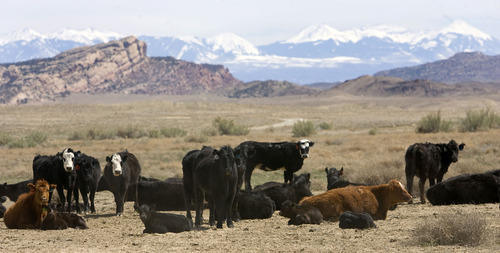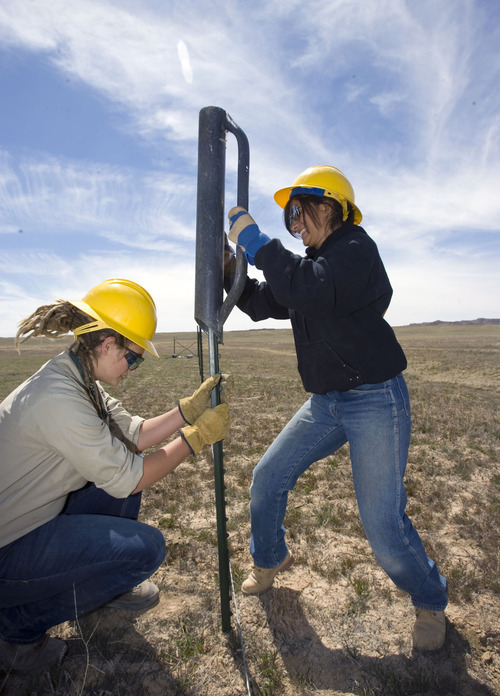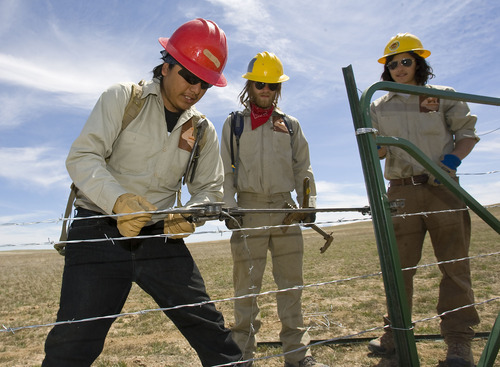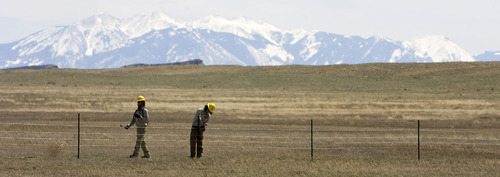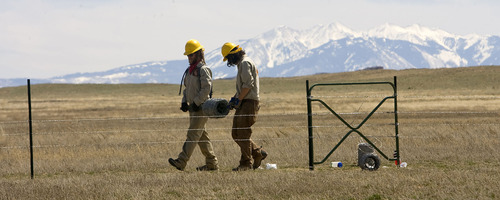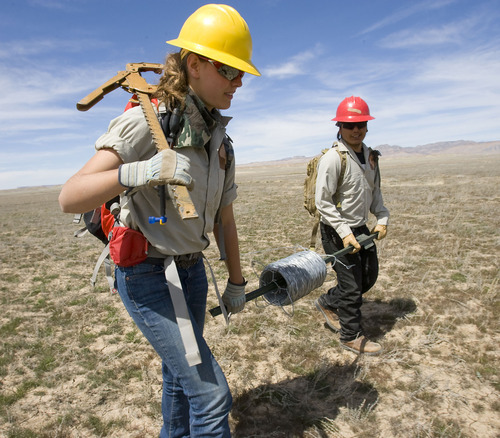This is an archived article that was published on sltrib.com in 2011, and information in the article may be outdated. It is provided only for personal research purposes and may not be reprinted.
Moab • Hannah Ryan is exploring canyons and deserts of the Colorado Plateau for the first time this spring — and not just for fun.
The 19-year-old Idahoan, who has spent her young adulthood thumbing around the West, is now pounding fence posts into the crusty yellow earth and stringing barbed wire, earning a $290 weekly stipend with room (often a tent), board and transportation, plus some inspiration for a possible career in the outdoors.
On a two-month tour employed by the nonprofit Canyon Country Youth Corps, she's with a seven-member crew that's learning about desert ecosystems while helping federal land managers protect them. Ryan is one of dozens who this year will work for the Monticello-based corps, building fences, maintaining trails or cutting down non-native trees. They are the kind of outdoorswomen and men in training that President Barack Obama, in unveiling his "America's Great Outdoors Initiative" two months ago, said the nation needs to nurture.
"I'd like to get involved in the Forest Service," Ryan said while helping put up a fence on the sparse grassland flats south of Grand County's Crescent Junction last week. The project is part of a Bureau of Land Management exclosure program to see how keeping cows off patches of land affects the vegetation. "I'd love to end up as an interpretive park ranger."
Crew members also earn education grants if they work long enough, starting with $1,000 at 300 hours.
Obama's plan, drawn up after a national listening tour by resource officers, includes many components. Perhaps most striking among them: a rare full-funding push for the chronically underfunded Land and Water Conservation Fund.
It also calls for pumping up the network of youth corps groups that cater to conservation work. When Obama announced that, it attracted attention at the Four Corners School of Outdoor Education, the Monticello nonprofit that sponsors several programs, including the Canyon Country crews.
"It showed a lot of leadership," school Executive Director Janet Ross said. "When it's fully ramped up, it will help youth corps groups to get kids off the couch and into the outdoors to learn what's going on out here."
Fully ramping up assumes Congress will provide funds for boosting the programs in next year's budget — hardly a given. The president has not identified how much funding should go to youth outdoor programs.
Whatever the number, it surely will be overshadowed by the $900 million it would take to fill the Land and Water Conservation Fund to its statutory but usually ignored allowance, compared to the $38 million it got this year.
There are more than 100 youth corps groups nationwide, and most of them rely heavily on federal funds. Canyon Country draws about half its funding from other sources, such as foundation grants.
Starting with the Great Recession in 2008, job-seeker demand for the program has been higher than usual. The corps received 200 applications last year for 90 spots. The same number applied this year, for 60 spots. Staffers grade applicants the same as any employer might, but with extra attention to an affinity for nature.
"They have to want to camp and be outdoors," Ross said. "You know, this is hard work."
The fence crew, which will labor two months building football field-size exclosures, camps while working nine days in a row before five days off. On off days, workers can stay at the school's bunkhouse in San Juan County — though many say they use that time to explore the canyons between here and the Grand Canyon with newfound friends — or just to go into Moab for dinner and a movie.
Ryan arrived in Moab a few days before she was scheduled to work, and she made fast friends at a hostel. She spends off days hiking Moab trails with those friends, and might stick around to seek a tourism job this summer.
Although a resource-related career is on her mind, the corps' more immediate attractions were simpler.
"I wouldn't have to pay to live," she recalled of her motivation to apply. "And I wanted fulfilling work, and to see some of the Southwest, because this place is so beautiful."
She said that after thrusting a steel rod into the ground with a two-handled post driver.
"It's hard work, but it feels good when you're done," she said. "You're ready to relax, but not exhausted."
Crew leader Clayton Meyer, a lanky, dreadlocked 24-year-old whom drinking Salt Lakers may recognize from his days behind the counter at the Sugar House state liquor store, said he came out here when he tired of being inside.
"I got tired of living in cities," he said. "I decided I wanted to work outdoors."
He moved to Durango, Colo., and has worked several projects with the corps since 2009. He will have to find a new assignment, though, because these crews must be between age 16 and 24.
"I was thinking about applying for the Forest Service," he said, "after I get some traveling done."
The troop hires youngsters from around the country, but also many from the nearby Navajo Nation.
Edward Rockbridge, a Navajo who saw a flier for the corps at a reservation chapter house in Arizona a few years ago, is now a crew leader.
Like Meyer, he is 24 and looking to move on. He has earned $5,300 in education awards and plans to go to automotive school.
He has enjoyed the travel, working on one crew that cleared wildfire fuel near Williams, Ariz., and another that worked to regenerate aspens around Coalville.
"It was beautiful," he said of the northern Utah mountains.
This fence-building crew has taken a keen interest in the project's purpose, said Ann Marie Aubry, a hydrologist in the BLM's Moab field office. It's meant partly to test whether certain grazing practices increase the salinity of runoff into the Colorado River, an issue arising from a treaty that requires the United States to leave some clean water in the river for Mexico.
"They understand my goal," she said. "I hardly have to supervise them. I don't supervise them. I feel like they appreciate the information, beyond just pounding a fence post."
On-the-job training
Youth and the conservation corps nationwide • corpsnetwork.org
Canyon Country Youth Corps • fourcornersschool.org


